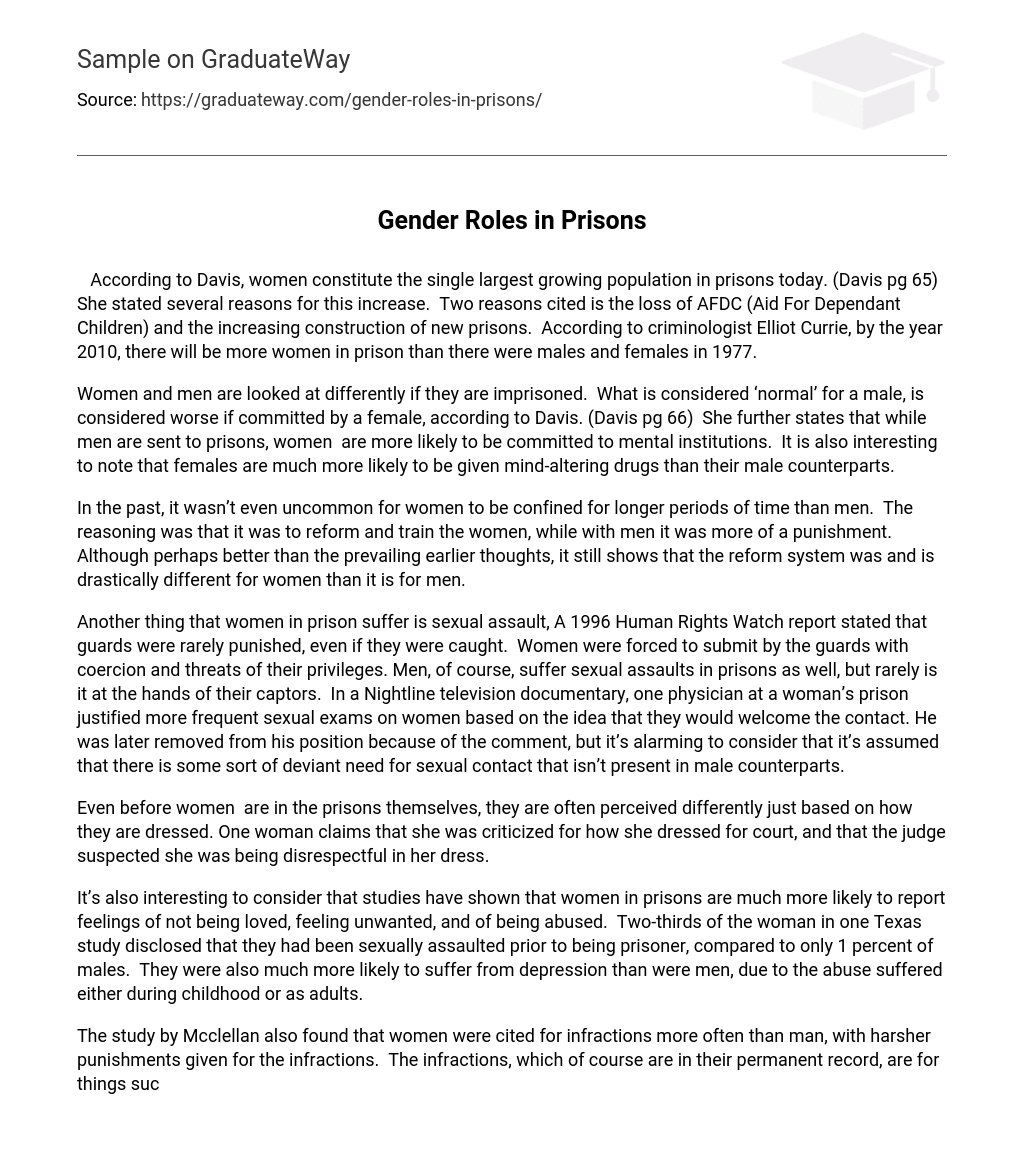According to Davis, women constitute the single largest growing population in prisons today. (Davis pg 65) She stated several reasons for this increase. Two reasons cited is the loss of AFDC (Aid For Dependant Children) and the increasing construction of new prisons. According to criminologist Elliot Currie, by the year 2010, there will be more women in prison than there were males and females in 1977.
Women and men are looked at differently if they are imprisoned. What is considered ‘normal’ for a male, is considered worse if committed by a female, according to Davis. (Davis pg 66) She further states that while men are sent to prisons, women are more likely to be committed to mental institutions. It is also interesting to note that females are much more likely to be given mind-altering drugs than their male counterparts.
In the past, it wasn’t even uncommon for women to be confined for longer periods of time than men. The reasoning was that it was to reform and train the women, while with men it was more of a punishment. Although perhaps better than the prevailing earlier thoughts, it still shows that the reform system was and is drastically different for women than it is for men.
Another thing that women in prison suffer is sexual assault, A 1996 Human Rights Watch report stated that guards were rarely punished, even if they were caught. Women were forced to submit by the guards with coercion and threats of their privileges. Men, of course, suffer sexual assaults in prisons as well, but rarely is it at the hands of their captors. In a Nightline television documentary, one physician at a woman’s prison justified more frequent sexual exams on women based on the idea that they would welcome the contact. He was later removed from his position because of the comment, but it’s alarming to consider that it’s assumed that there is some sort of deviant need for sexual contact that isn’t present in male counterparts.
Even before women are in the prisons themselves, they are often perceived differently just based on how they are dressed. One woman claims that she was criticized for how she dressed for court, and that the judge suspected she was being disrespectful in her dress.
It’s also interesting to consider that studies have shown that women in prisons are much more likely to report feelings of not being loved, feeling unwanted, and of being abused. Two-thirds of the woman in one Texas study disclosed that they had been sexually assaulted prior to being prisoner, compared to only 1 percent of males. They were also much more likely to suffer from depression than were men, due to the abuse suffered either during childhood or as adults.
The study by Mcclellan also found that women were cited for infractions more often than man, with harsher punishments given for the infractions. The infractions, which of course are in their permanent record, are for things such as too many photographs hanging up and drying their undergarments. Others were cited for things such as sharing shampoo or other personal items.
In one case brought to court Mcclellan tells “In a suit recently litigated and won, Cain v. Michigan Department of Corrections (MDOC), the women prisoners contended, and our research confirmed, that disciplinary rules were not applied equally to male and female prisoners.”
Fairness and equality in prisons is an ongoing issue, however, perhaps part of the solution rides in prevention of the problems in the first place. Intervention early may well be the answer, starting with our youth.
Barring that, the states must strive to not only treat women and men fairly in prisons, but to remember that women and men are different. Their roles in life are different, thus they are going to be different in prison as well.
It is unfair to assume, however, that a woman who is arrested is somehow more at fault than a male who commits the same offense. Gender bias is just as serious a problem as racial bias.
Works Cited
- Dorothy S. Mcclellan, “Coming to the Aid of Women in U.S. Prisons,” Monthly Review June 2002, Questia, 16 Dec. 2005 <http://www.questia.com/PM.qst?a=o&d=5002474988>.





